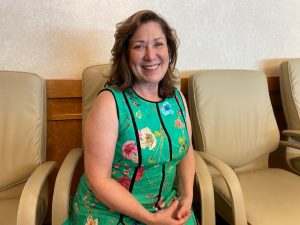
Georgiana Young was perfectly content in her job as vice president of marketing and sales at Miami’s Arsht Center for the Performing Arts. Then she got a call from Lee Bell.
She was aware that Bell, senior director of programming at the Kravis Center for the past 24 years, had announced his intention to retire, so she felt she owed him a call or maybe lunch. But Bell beat her to the punch, calling her and opening with a sentence that would change her life. As Young vividly recalls, “He said, ‘Georgiana, I have a little idea for you,’ And that’s how it started.”
Yes, he felt she was the right person to fill his shoes and, after a series of interviews, the Kravis board of directors felt so too.
Young officially begins her new duties August 23, but she sat in a Cohen Pavilion board room in mid-July for a free-wheeling chat about the challenges before her.
After researching the West Palm Beach arts complex, she was eager to take the position because “Well, it’s a combination of things,” she says. “You have this spectacular performing arts center here that has a very broad portfolio of programming. They’re going to do the fun comedians, but they’re also going to do (opera star) Renée Fleming. They do major orchestras, like the Cleveland Orchestra, and they have a big commitment to dance.
“As I was prepping for my interview, I decided to diagram it out on an Excel spreadsheet and I realized (the breadth of programming) was mammoth. A major commitment to education, a major commitment to Broadway. And it’s an equal commitment to all of it. To me it says we’re trying to serve the entire community.”
Young, 61, divorced, fluent in Spanish, has more than three decades of experience in arts management. She served as chief programming and marketing officer at the Straz Center in Tampa, has production experience in such diverse international locations as the United Kingdom, Spain, Italy, Germany, the Middle East and China. But she speaks most passionately about her tenure leading the Paiz Foundation in Guatemala City, whose mission is to make the arts accessible to marginalized and at-risk youth.
Music was a large part of her life growing up. “It was a musical family. We always sang. I was the vocalist for the jazz band at Rice (University in Houston),” where she graduated with a B.A. in English literature and Spanish translation. “But I had absolutely no idea what I wanted to do when I graduated. I didn’t even know that jobs like this existed.”
Soon after college, Young worked as a production assistant at the Tower Theatre in Houston. “When the show closed, someone said the people who owned the theater were looking for someone in motor sports. It was Pace Entertainment Group, a very small company at the time. And I got hired in motor sports for a year, until somebody quit in their new theatrical division,” and she switched over to it as the division kept growing. “What’s really interesting is they wound up being the largest entertainment company in the world,” including renting the Kravis Center for Broadway shows, Young says.
That is how she happened to be at the Kravis’s grand opening gala in 1992. “I just remember there was just nothing around here.” Young says. “What I think is really exciting is now the Kravis is no longer on an island by itself, but in the middle of a neighborhood that is growing and vibrant. So the question is now, how do you get the traffic to stop and linger a bit and get them to try something?”
Almost 30 years after the Kravis first opened its doors, Young feels the main challenge she faces is introducing the performing arts center to the many South Floridians who have never been inside.
“I’m not an expert on Palm Beach County,” she concedes. “But I think what’s important is you’ve got people driving by the theater every single day and they probably look to their right and go, ‘I wonder what they do in there.’ It happens all over the world. People wondering, ‘Am I going to see people like me in there? Am I going to feel comfortable? Do I fit in? And can I afford this?’ ”
In the effort to grow the Kravis’s audience, the coronavirus pandemic hasn’t helped. “We’ve all been through 18 months of isolation,” Young says. “So how do we get them to now step out of their homes and come back or even try the theater as an option?”
Young is raring to go, to flex her programming muscles, but as with all arts centers of the Kravis’s size, Bell has already booked most of next season and beyond. “When’s my season?” she asks, anticipating the question. “Well, Lee told me there are a few dates open in January and February, so we’re still in the time that you’re filling in. I think he’s probably done parts of ’22-’23, but there will definitely be some of me that season.”
Finally, how will she measure her success at the Kravis? “It’s not like the days in commercial theater where your success was based on how much money you make,” Young says. “It’s a lot about the audience. Of course, it’s always going to be about artistic excellence but it’s also about growing the audience. And it’s about balancing those two.”